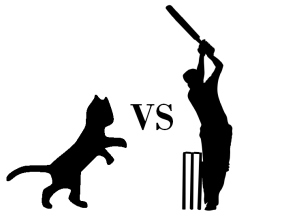I wonder how many people reading this post are the CAT-result-victims! I, too, am one of them. But, I do not feel guilty of screwing up the exam badly. On the contrary, I feel happy that the following thought struck my mind. It wouldn’t have struck had I qualified the test.
Here, I’m demonstrating a simple game (it is analogous to Cricket) just that the rules are not defined properly.
Here are the rules of the game:
- There are 20 overs in the game.(20 questions)

- A player can chose to play as many overs as he/she wished. (you can mark as many questions as possible)
- Every over has 3 balls to play.(QA,DI,VA)
- Runs are allotted only for SIXERS*. (Only if your answer is completely right)
- If you dodge the ball, and its not a SIX, you will be considered OUT, and negative runs** will be awarded. (negative marking)
- If you leave the ball untouched, you will be zero runs.
- Total score of the player will be declared only at the end of the innings.
- Umpire (prometric) is always right.
* Here, I did not mention that 6 runs will be awarded for hitting a SIX. I just want to say that some runs will be awarded if you are able to hit the ball hard enough to cross the boundary directly.
** Again, I did not mention how many negative runs will be awarded. Let’s say some negative runs are awarded.
That’s it! It’s a simple game. Ain;t it?
Game Theory says that for every action, the player will think about increasing his total Utility. In this case, Utility being his total runs scored. Now, since the marking criteria is not mentioned, a very very very very very very very very rational player, simply assumes that the criteria can be the same as it was the last year, last to last year, or even the year before that.
Let’s take the case of the the most rational player on this planet. Always remember, “you” are the most rational person on this planet. He assumes that the marking criteria is +4 for a correct answer and a -1 for every wrong answer that he attempts.
Simple, isn’t it.
Let’s now calculate his risk taking ability. Since he assumes that, In every 5 questions that he attempts, if exactly one is correct, it would do no harm to him. And the score for multiple correct answers will always be in his favor.
1 correct : +4
4 wrongs : -4
total : 0 (zero)
So, in this case, his risk taking ability will be high. He will mark more questions assuming the above strategy.
Similarly, let’s assume that he thinks marking system will be something like: +3 for a correct answer and -1 for a wrong answer.
Now, his risk taking ability would certainly decrease by some amount. In this case, he’d be ready to attempt 4 questions blindly assuming that even a single right answer would do no harm to his score.
1 correct : +3
3 wrongs : -3
total : 0 (zero)
Similarly for a +2, -1 system :
1 correct : +2
2 wrongs : -2
total : 0 (zero)
Worst case Scenario, let’s assume that he assumes, +1, -1
1 correct : +1
1 wrongs : -1
total : 0 (zero)
In this case, no one would dare attempt a question as long as one is damn sure that their answer is correct. I even feel that some people might be so insecured that they keep wasting their time on the questions they have already attempted just to make sure that they are not wrong. Because, in a condition like this, every wrong answer will balance out your every correct answer and every failure is equal to every other success. And, there is no learning in an exam hall.
It is true that risk taking capacity of every student is different. All that I’m trying to show here is that risk taking is directly dependent on the marking scheme of the examination. As long as the marking scheme is not properly mentioned, how can a student be confident of taking a risk? And the IIMs are definitely not looking for people who take blind risk, or are they?
So here we were playing a game with a blank scoreboard in front of us without knowing what strategy has to be applied and when.
Now I understand that Schrödinger was not just a genious, but he could see the future too. He was so very true when he said :
the CAT remains both alive and dead (to the universe outside the box) until the box is opened.
Well, When I opened the box, my CAT was already dead and she was stinking so badly that I could hardly breathe. 😛
PS: I am not trying to prove anyone right or wrong in this post. I have just made an attempt to put my thoughts into words so that others whose CAT, just like mine, has been found dead/missing, would not lose hope and start questioning their abilities. 🙂